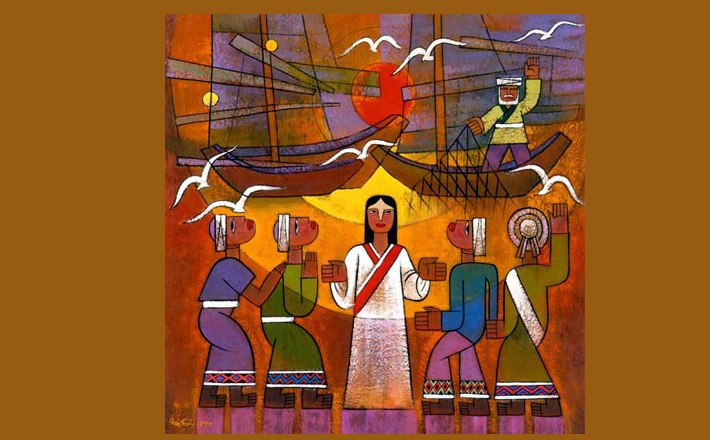Commentary on Isaiah 9:1-4
As I write, fall is already upon me, summer is long past, and winter is rapidly approaching.
With the exception of Alaska, I live in one of the furthest northern states in the US, which experiences long nights and short days during the winter months. Add to that the gloom of frequent rainfall and you will understand the sense of dread that has begun to sink in given the fact that I enjoy the outdoors, particularly cycling. For me a season of darkness is inevitable and unavoidable every year.
Epiphany appropriately falls in January, during the winter, before spring has arrived and the days have lengthened, to remind the people of God that we live according to a different clock. Epiphany is a season of light not during the day but a season of light amidst the darkness. It is a season of light that ushers in the daytime and in this regard Epiphany is one step ahead of the world.
The First Reading for this Sunday addresses a people who despair because they lack the light. Isaiah 9:1 serves as a transition text between the prophecy of impending judgment in Isaiah 8:16-22, and the psalm of thanksgiving in 9:2-7. In 8:16-22 the prophet announces a period of distress, gloom, and thick darkness that will befall the people. Hunger will fill the people and they will be enraged and curse their king and gods. In their despair they will turn to necromancy, consult ghosts and the dead, and forsake the instruction of the Lord. This is not merely a description of darkness, but it is the language of death and the underworld.
Isaiah 9:1-2 acknowledges this “former time” of deep darkness in the land of Zebulun, Naphtali, the way of the sea, the land beyond the Jordan, and Galilee of the nations. These geographical designations all refer to a territory directly west of the Sea of Chinnereth, later to be named the Sea of Galilee. It was this land that the Assyrian king, Tiglath-Pileser III, conquered and deported its citizens to Assyria in 732 BCE according to 2 Kings 15:29 and extra-biblical material.
Gloom and darkness signify the devastation to the land and the people’s experience of military defeat. In these conditions, hunger and depopulation were ever present challenges facing the people. It has been said that the biblical prophets are survival literature of war-torn communities, and Isaiah 9:1-4 would certainly not be an exception to this rule.
To a destitute people Isaiah announces a coming age when night will be transformed to day. Israel need not despair because the same people who walked in darkness will experience a great light. Throughout the book of Isaiah, particularly chapters 40-55, the prophet will associate God’s work of salvation with the “new” or “latter” things in contrast to “former things.”
In fact, the prophet will characterize God’s self as being “the first” and “the last” (41:4; 44:6; 48:12). The text of 9:1 [8:23 in the Hebrew text] is difficult to decipher such that some scholars have interpreted the “former” and “latter” to refer to persons rather than to time: “For if there were to be any break of day for that land which is in straits, only the former kingwould have brought abasement to the land of Zebulun and the land of Naphtali while the later one would have brought honor to the Way of the Sea, the other side of the Jordan, and Galilee of the Nations” (8:23, NJPS). This reading associates the “former king” with the king of Assyria, and the “latter one” with the royal announcement of 9:6-7. According to this reading the king of Assyria ushered in darkness, and the Wonderful Counselor, Mighty God, Everlasting Father, and Prince of Peace will bring in light.
Perhaps the ambiguity of the language regarding whether a person or time is being spoken of, is precisely the point. That is, the blurring of era and agent signifies that the transition from a period of darkness to one of light is predicated upon a person. The light shines because someone “will make glorious the way of the sea” (9:1).
In this case light is not a given; the day is not obligated to dawn. It is because of divine action that a great light appears, the nation is multiplied, harvests are fruitful, and victory is achieved. Verses three and four describe how the light reverses the hunger, depopulation, and military defeat incurred in the darkness. There is no tyranny of time with God, there is no “the inevitable,” nothing is “automatic,” and fate does not rule.
Later on in Isaiah 60:1-3, a passage read earlier on Epiphany, the prophet equates the glory of the Lord with light; they are one and the same. Psalm 27:1, our Psalm text for today, equates light with salvation. Light and salvation emanates from the LORD; they are gifts of grace.
As one who lived in sunny Southern California for many years, I can see how people can be deluded into thinking that they are entitled to light and that darkness is an inconvenient nuisance. God’s calendar reminds us that dawn is an act of grace and that darkness is always a prelude, and never a finale. When Matthew interprets the early days of Jesus’ ministry in Galilee as the fulfillment of Isaiah 9:1-2 in Matthew 4:12-17, he recalibrates our spiritual clocks.
Darkness continued to oppress Israel far beyond the activity of the king of Assyria. Yet with the preaching of repentance by the Messiah the new day of salvation has dawned and the kingdom is here. So even if the nights are long and the days are short, know that in the appearance of Christ the day has come. Live according to the timetable of God. Live in the light.


January 26, 2014